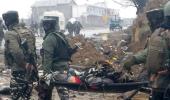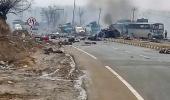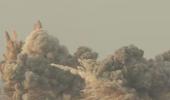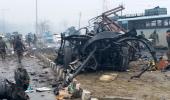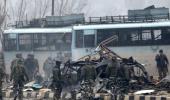'The bottom line is that disproportionate losses should be avoided at all cost and terrorists should be denied tactical successes that act as opium for them to become bold to achieve perceived victory.'
'This is a long war and instead of rushing to achieve quick success, the objective should be not to give any success to the terrorists in terms of casualties and freedom of movement.'
'Every soldier martyred by terrorists in combat is a moral victory for them,' says Brigadier Narender Kumar (retd).
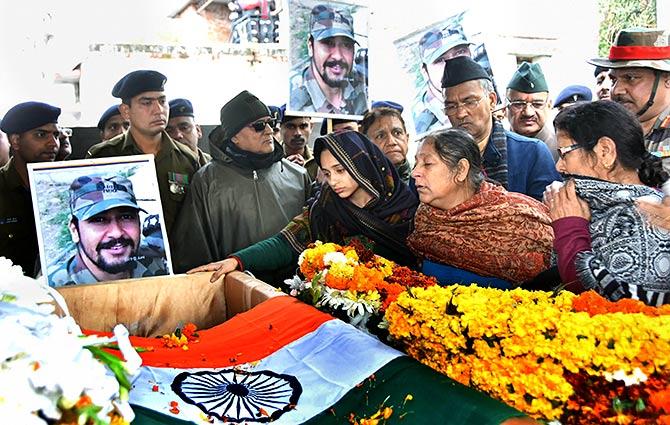
Forces took heavy losses in Pulwama encounter to avoid civilian casualties? Is it a benchmark and a precedence for future counter-terrorist operations?
If it is so, there is a serious flaw in the thinking and strategy being followed by the security forces in Kashmir.
When I took over the command of a Rashtriya Rifles unit, my first address to my men was, 'I do not want any of my soldier or officer to lay down his life for the country. I am not here to send you wrapped in the Tricolour'.
My Subedar Major almost fell off the chair and gave me a serious look, probably thinking what I as a new commanding officer was saying that we will not commit ourselves to lay down our lives for the nation.
With a little pause, I said, 'I want our enemies to die for their cause and their country. I want each one of you to live and fight for another day.'
There was pin drop silence, but the message was driven home that I value your lives and we have to fight by using our superior skills and precise intelligence, for which we had to prepare and work hard.
The bottom line is that disproportionate losses should be avoided at all cost and terrorists should be denied tactical successes that act as opium for them to become bold to achieve perceived victory.
This is a long war and instead of rushing to achieve quick success, the objective should be not to give any success to the terrorists in terms of casualties and freedom of movement.
Every soldier martyred by terrorists in combat is a moral victory for them.
The Pulwama encounter indeed has reversed the momentum of counter-terrorist operations and given moral victory to the terrorists due to the extremely high ratio of loss of lives in the suicide attack and the subsequent Pulwama encounter.
This is a 'long war' and the 'lone option' is to tire the terrorists and deny them a sense of victory by not losing men.
If security forces deny loss of lives of their own men, the terrorists will be frustrated with their own losses and are bound to commit more mistakes.
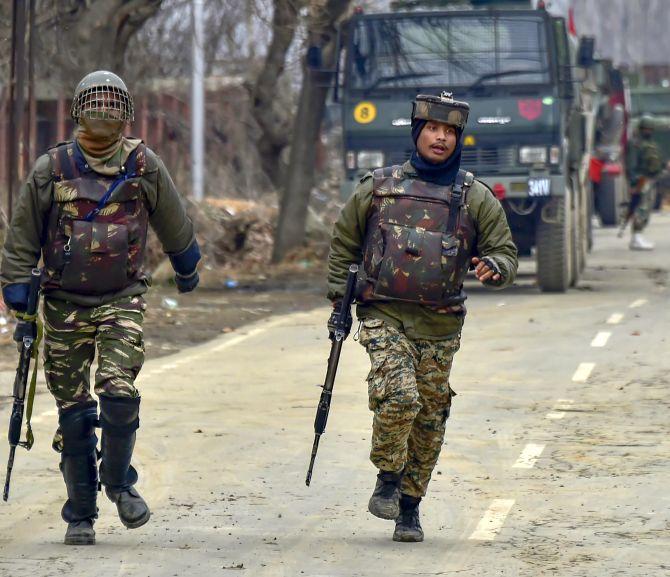
The operation was conducted in an area 12 km from the February 14 terror attack on CRPF personnel which left 41 jawans dead.
Killing terrorists at great cost is our failure and their victory.
There can be no justification to lose men and there is no sense of achievement and pride to send coffins wrapped in the Tricolour back home. It is a loss and friction of own combat potential.
In any case, such heavy losses cannot be sustained.
If the military hierarchy does not question, citizens and soldiers will certainly question the wisdom of leadership and their planning of operations that are counter- productive.
The security forces must know that idea of terrorism cannot be killed by the gun. The security forces have neither the mandate nor capabilities to end terrorism or a socio-political conflict, their task is to supress the violence by use of legitimate force.
Force in any case is not a tool for conflict resolution or to redress the grievances. That mandate rests with the legislature and executive. But unfortunately both these agencies have abdicated their responsibilities with regard to conflict resolution and a 'baby dead on arrival' has been handed over time and again to the security forces.
Security and safety of men is a 'Superior Command Responsibility'. Letting men to display bravado and commit mistakes when there are other means available while operating under hostile environment is a 'Breach of Duty' and commanders at all level must correct this phenomenon.
Failure of commanders to implement the 'necessary and reasonable measures' is a serious breach of responsibility that cannot be condoned.
What are the lessons from this operation? Operational and strategic leadership should not micromanage tactical operations.
Let the Company Commanders, Commanding Officers and frontline soldiers operate in real time with a clear mission to act with deep sense of responsibility to cause maximum damage with minimum losses.
In counter-terrorist operations, men and tactical commanders cannot be given free run either to lose their own lives out of sheer bravado or use disproportionate force to cause collateral damages.
Tendency of commanders to rush in must be curtailed. Senior leadership should not demand results from the subordinate commanders, rather they should create conditions for men to achieve results.
The cornerstone of success of operations is intelligence and precise strikes without loss of lives of our soldiers.
Chasing shadows and violating standard operating procedures is a cardinal mistake that needs to be corrected.
The notion of 'Free Hand' also needs to be debunked because it is misleading and creates a perception that political leaders have done what they could do, it is failure of security forces and not theirs.
The security forces should not fall in a trap of 'Free Hand'. The rhetoric of 'Free Hand' has no locus standi in the eyes of the law.
Has the government made amendments to the Armed Forces Special Power Act to make the so-called 'Free Hand' condoned by the law?
Or signed a new directive of Status of Forces and Mandate for Operations?
No! not at all. Therefore, the security forces should not play to the gallery and rather act with conscience as a citizen first and soldiers later by upholding the ethics of soldiering.
There is no place for a soldier to indulge in unethical practices. A soldier must act under three circumstances.
First, act against those who wage war against the State, second, act against those who attempt to bring harm to the soldiers and third, act against those who obstruct the rule of law.
Soldiers are required to operate without prejudice of cast, creed, race and religion. Thus, there is no place for any action driven by sense of retribution.
Brigadier Narender Kumar (retd) is a Distinguished Fellow at the United Services Institute of India.
